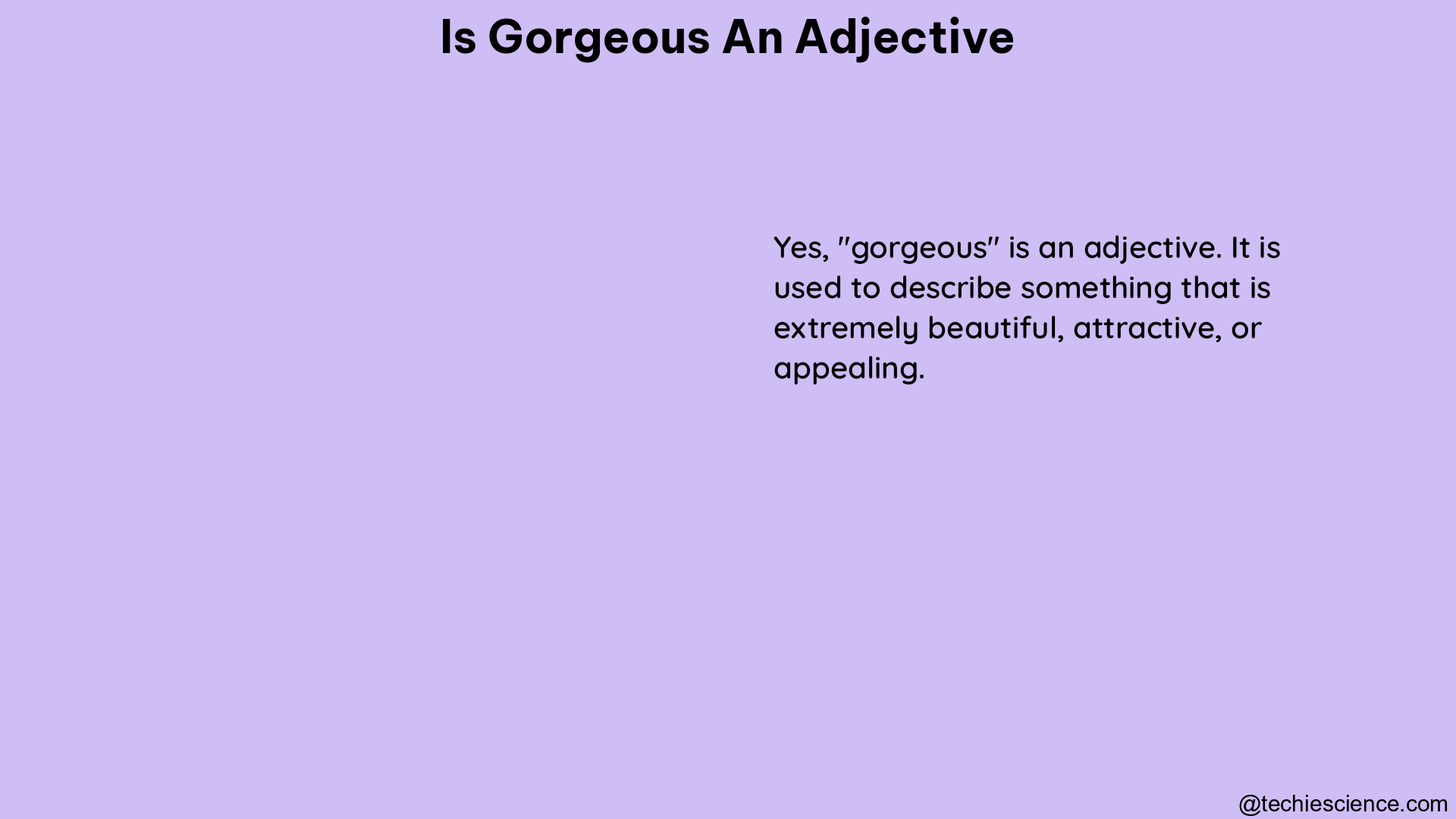Yes, “gorgeous” is an adjective that is used to describe something or someone that is exceptionally beautiful, attractive, or pleasing to the senses. This comprehensive guide will delve into the definition, meaning, synonyms, antonyms, usage examples, etymology, pronunciation, frequency of use, and related forms of the adjective “gorgeous.”
Definition and Meaning of “Gorgeous” as an Adjective
The adjective “gorgeous” means that something is splendid, sumptuous, or magnificent in appearance, coloring, or other qualities. It is used to describe people, objects, or scenes that are exceptionally beautiful or pleasing to look at. The Oxford English Dictionary defines “gorgeous” as “of very beautiful, elaborate, or impressive appearance; magnificent, superb, splendid.”[^1]
For example, one might describe a sunset as “gorgeous” due to its breathtaking colors and striking visual appeal. Similarly, a person could be referred to as “gorgeous” to convey their exceptional physical beauty and attractiveness.
Synonyms and Antonyms of “Gorgeous”

As an adjective, “gorgeous” has several synonymous words that convey a similar meaning of exceptional beauty or attractiveness. Some common synonyms of “gorgeous” include:
- Beautiful
- Lovely
- Handsome
- Attractive
- Pretty
- Stunning
- Charming
- Magnificent
- Splendid
- Sumptuous
On the other hand, the antonyms of “gorgeous” are words that express the opposite meaning of exceptional beauty. Some antonyms of “gorgeous” include:
- Ugly
- Hideous
- Unattractive
- Plain
- Unpleasant
These antonyms suggest a lack of visual appeal or aesthetic appeal, which is the opposite of the meaning conveyed by the adjective “gorgeous.”
Examples of “Gorgeous” Used in Sentences
The adjective “gorgeous” can be used in various contexts to describe the exceptional beauty or attractiveness of something or someone. Here are some examples of “gorgeous” used in sentences:
- “The difference in appearance can be dramatic, as I saw on a visit to the small, modern factory where Pineider prints its stationery, in a gorgeous part of Tuscany near Florence and bordering Chianti.” —Corby Kummer, Atlantic, May 2001.
- “Your baby is absolutely gorgeous!”
- “Sunsets in Hawaii are just gorgeous!”
- “The bride wore a gorgeous white lace gown for her wedding.”
- “The interior of the new luxury hotel is designed with gorgeous marble floors and crystal chandeliers.”
- “The model’s gorgeous features and striking appearance made her the perfect choice for the magazine cover.”
These examples demonstrate how the adjective “gorgeous” can be used to describe a wide range of subjects, from natural landscapes and architectural features to people and their physical appearances.
Etymology and Pronunciation of “Gorgeous”
The word “gorgeous” originated in the late 15th century from the Old French word “gorgias,” which meant “fine” or “elegant.” The exact origin of the word “gorgias” is unknown, but it is believed to be related to the Latin word “gurgullio,” meaning “throat” or “gullet.”[^2]
The pronunciation of “gorgeous” varies slightly between British and American English. In British English, the word is pronounced as /ˈɡɔːdʒəs/ (GOR-juhss), while in American English, it is pronounced as /ˈɡɔrdʒəs/ (GOR-juhss).
Frequency of Use of “Gorgeous”
The adjective “gorgeous” occurs approximately 3 times per million words in modern written English.[^3] However, its usage has varied over time, with peaks and declines in its frequency of use.
According to the Corpus of Historical American English (COHA), the usage of “gorgeous” peaked in the 1920s and has since declined, though it remains a relatively common adjective in contemporary English.[^4]
Related Forms of “Gorgeous”
In addition to the adjective form, “gorgeous” also has related forms, including:
- Adverb: The adverb form of “gorgeous” is “gorgeously.” For example, “The sunset was gorgeously vibrant.”
- Noun: The noun form of “gorgeous” is “gorgeousness.” For example, “The model’s gorgeousness was captivating.”
These related forms allow for the adjective “gorgeous” to be used in different grammatical contexts, such as modifying a verb (adverb) or functioning as the subject or object of a sentence (noun).
Conclusion
In summary, “gorgeous” is an adjective that is used to describe something or someone that is exceptionally beautiful, attractive, or pleasing to the senses. It has a rich history, with origins in Old French, and is a relatively common adjective in modern English, though its usage has varied over time. Understanding the definition, meaning, synonyms, antonyms, usage examples, etymology, pronunciation, frequency of use, and related forms of “gorgeous” can help writers and speakers use this powerful adjective effectively in their communication.
References
[^1]: “gorgeous, adj.” Oxford English Dictionary, Oxford University Press, www.oed.com/dictionary/gorgeous_adj.
[^2]: “gorgeous (adj.).” Online Etymology Dictionary, www.etymonline.com/word/gorgeous.
[^3]: Davies, Mark. (2010-) The Corpus of Contemporary American English (COCA). Available online at https://www.english-corpora.org/coca/.
[^4]: Davies, Mark. (2010-) The Corpus of Historical American English (COHA). Available online at https://www.english-corpora.org/coha/.

Hi…. I am Goutam Datta. I have completed a double M. A. in English and B. Ed. I am a creative writer. Currently, I am a part of the LambdaGeeks.